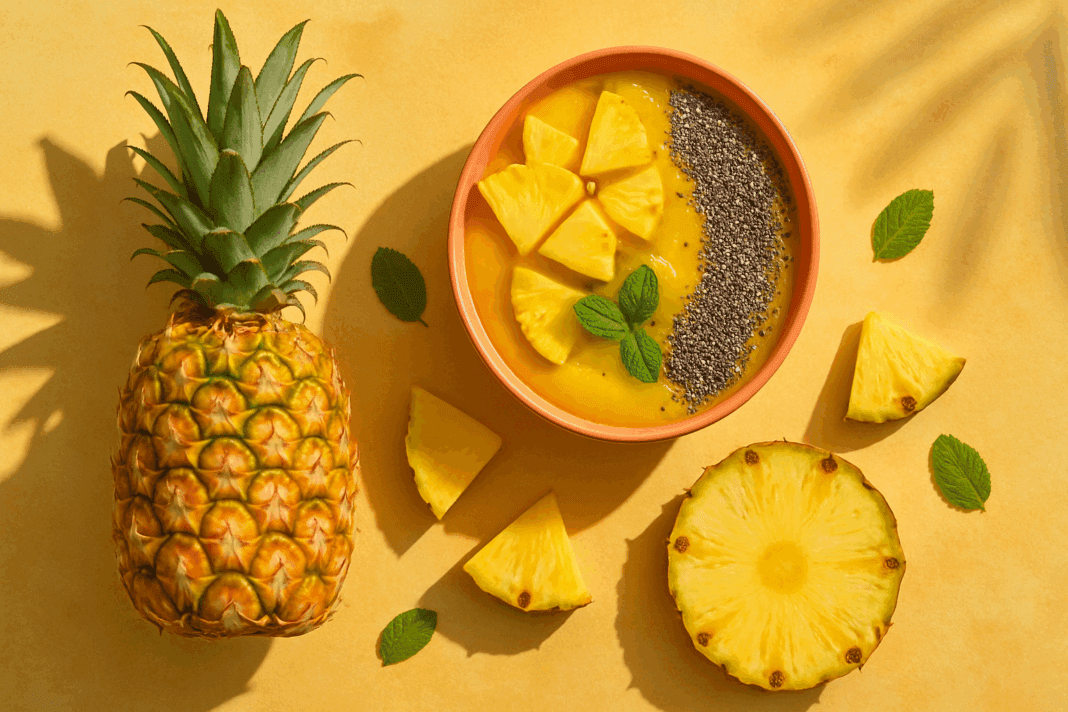A Juicy Question: Can Pineapple Play a Role in Healthy Weight Loss?
The question “is pineapple good for weight loss?” has surged in popularity as more people seek natural, nutrient-rich options to support a healthy lifestyle. Pineapple, with its sweet, tropical allure and vibrant nutritional profile, has long been a staple in many cultures. Yet beyond its tangy taste and decorative appeal in fruit salads and smoothies, researchers and nutritionists alike are exploring how this fruit might contribute to a sustainable and science-backed weight loss journey. At the intersection of evidence-based wellness and dietary choices, the discussion about pineapple for weight loss is no longer just a health trend—it’s a conversation rooted in biology, metabolism, and nutritional strategy.
You may also like: Expert-Backed Weight Loss Tips for a Healthier Lifestyle: What You Need to Know for Long-Term Weight Control and Wellness
Unlike fad diets that promise rapid results with little nutritional backing, incorporating whole fruits into a balanced eating plan aligns with well-established medical guidance. Pineapple is rich in essential vitamins, particularly vitamin C, as well as enzymes and antioxidants that are believed to support digestion and overall metabolic health. However, whether or not pineapple directly contributes to weight loss depends on multiple factors, including portion control, dietary context, and individual health status. The goal of this article is to examine what experts and clinical research actually say about the link between pineapple and weight management. We’ll explore its nutritional components, review how it may influence appetite and fat metabolism, and assess whether pineapple is healthy for weight loss when viewed through the lens of real-world, evidence-based dietary science.
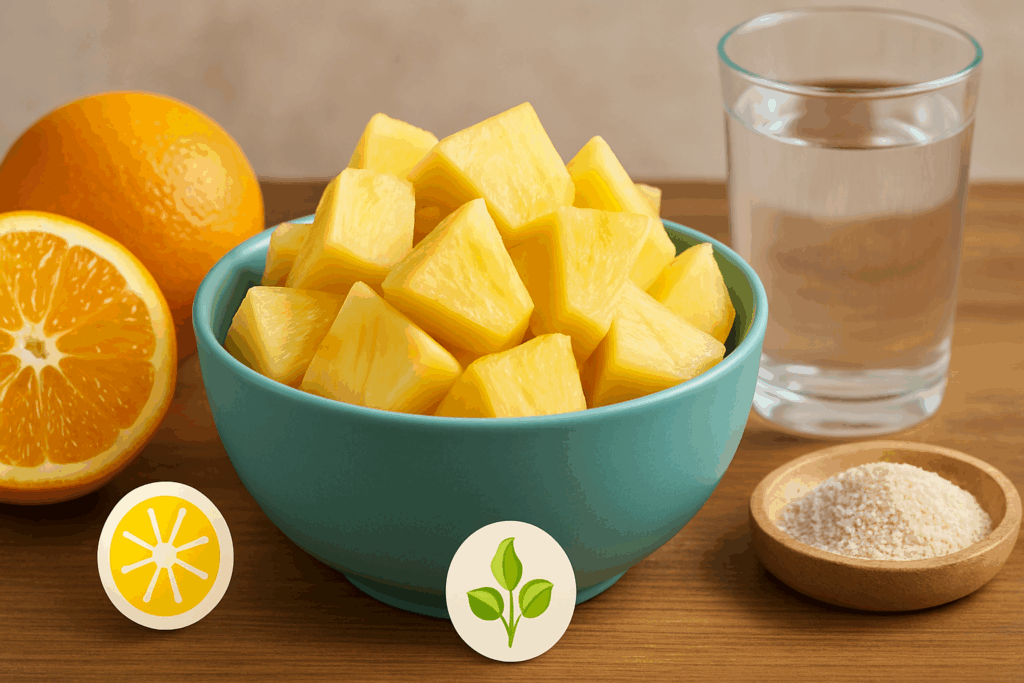
Understanding Pineapple’s Nutritional Profile and Caloric Value
To determine whether pineapple is a legitimate ally in weight loss, it’s essential to first understand its nutritional composition. A single cup of fresh pineapple chunks contains roughly 82 calories, making it a relatively low-calorie food that fits comfortably into most calorie-conscious meal plans. It provides a substantial dose of vitamin C—about 131% of the recommended daily value—as well as manganese, vitamin B6, and dietary fiber. The high water content of pineapple, which makes up approximately 86% of its weight, adds to its satiating effect while keeping caloric density low.
From a glycemic standpoint, pineapple is considered a medium-GI fruit, meaning it raises blood sugar more slowly than high-GI foods but more rapidly than low-GI options like berries or apples. While some worry that the natural sugars in pineapple could contribute to weight gain, the context in which the fruit is consumed is key. Unlike processed sweets, pineapple offers nutritional benefits beyond its sugar content, which can help moderate insulin response when consumed alongside fiber, protein, or healthy fats.
Dietitians often recommend fruits like pineapple not only because they’re filling and satisfying, but also because they support digestive health and reduce the temptation to reach for empty-calorie snacks. So, when asking “does pineapple help you lose weight,” it’s crucial to frame the question within a broader nutritional landscape. On its own, pineapple is not a miracle weight-loss solution, but within a balanced and calorically appropriate diet, it certainly has its place.

Bromelain and Digestion: A Unique Enzyme with Potential Weight Loss Benefits
One of the most intriguing aspects of pineapple is its bromelain content—an enzyme complex that has attracted considerable attention for its role in digestion and inflammation reduction. Found primarily in the fruit’s core and juice, bromelain assists the body in breaking down proteins into amino acids, potentially enhancing protein digestion and nutrient absorption. Improved protein digestion can contribute to better satiety and metabolic function, two factors that indirectly support weight management.
Some laboratory and animal studies have suggested that bromelain may play a role in reducing fat cell formation and promoting lipolysis—the breakdown of fat stores for energy. While these findings are promising, human trials are still limited, and more research is needed to draw definitive conclusions. Still, this adds another dimension to the question: is pineapple healthy for weight loss, particularly because of the unique compounds it contains? While bromelain alone won’t cause weight loss, its inclusion in a nutrient-dense food like pineapple enhances the fruit’s overall value as a health-supportive dietary component.
Bromelain has also been shown to exhibit anti-inflammatory properties, which may be beneficial in reducing chronic low-grade inflammation often associated with obesity and metabolic syndrome. By mitigating inflammatory responses, pineapple might indirectly support weight loss efforts in individuals struggling with conditions that impair metabolic health. Although not a cure-all, this enzyme contributes to the growing case for why pineapple for weight loss may be more than a myth.
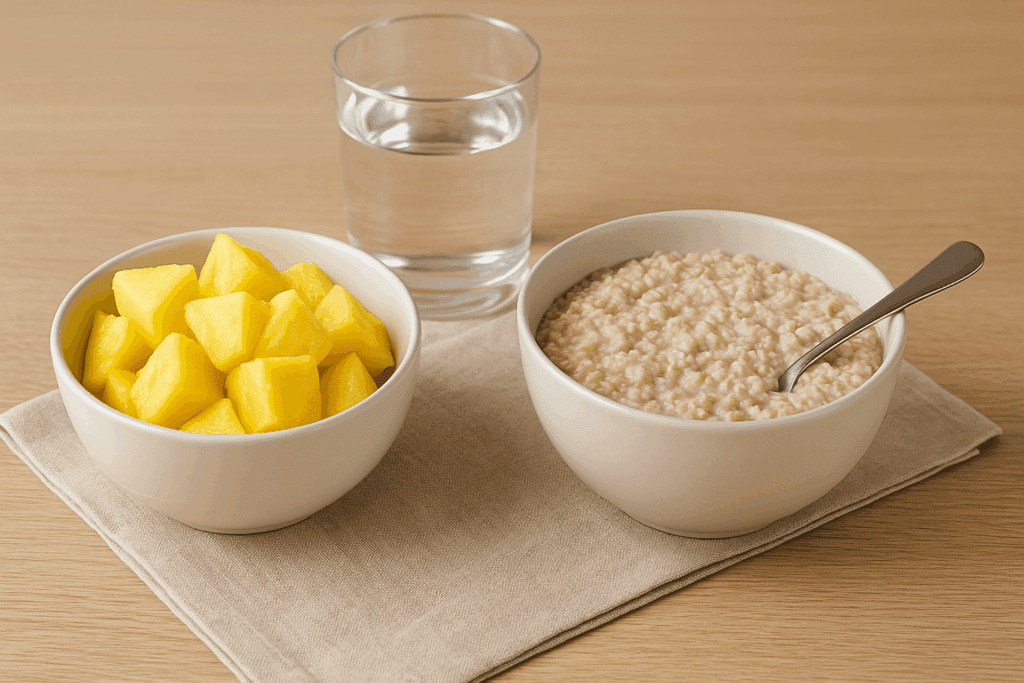
Satiety, Fiber, and Appetite Regulation: How Pineapple Fits the Picture
A critical but often overlooked component of successful weight loss is satiety—the feeling of fullness that helps prevent overeating. Pineapple contains around 2.3 grams of fiber per cup, primarily in the form of insoluble fiber, which adds bulk to the digestive tract and slows down gastric emptying. This prolongs the feeling of fullness after a meal and can reduce overall caloric intake, especially when pineapple is consumed in its whole form rather than as juice.
From a psychological standpoint, pineapple’s sweet flavor can also satisfy sugar cravings without the added fat and empty calories found in desserts and processed snacks. This can be a valuable tool for those trying to transition to a healthier diet without feeling deprived. However, portion control is essential. While the natural sugars in pineapple are preferable to refined ones, they still count toward daily carbohydrate and calorie totals. Eating large quantities of pineapple in one sitting—especially if juiced—could lead to an unintended calorie surplus and blunt any weight loss benefits.
Thus, when asking “does pineapple help u lose weight,” the answer depends largely on how and when it’s consumed. Pineapple can help regulate appetite and support weight control when eaten in moderation as part of a balanced meal plan. It should never be relied upon in isolation, but it can be a helpful addition for those seeking to make better dietary choices.
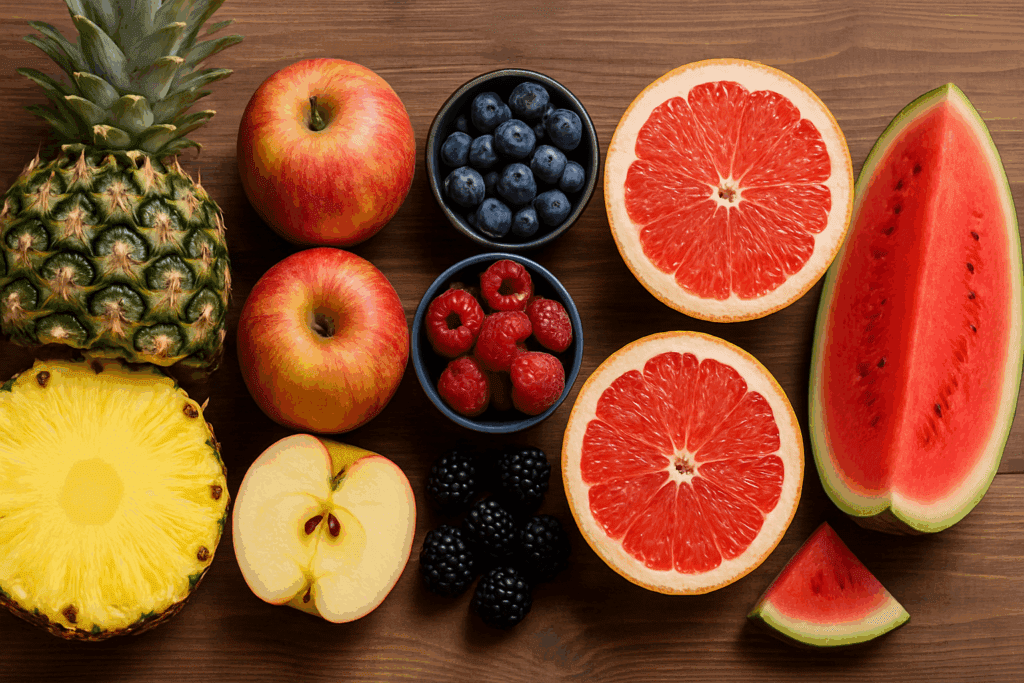
Comparing Pineapple with Other Weight Loss-Friendly Fruits
In evaluating whether pineapple is good for weight loss, it’s useful to compare it with other fruits commonly praised for their slimming potential. Fruits like berries, apples, grapefruit, and watermelon are often promoted in weight loss circles due to their high fiber content, low calorie density, and rich antioxidant profiles. Pineapple fits within this group, though with some caveats.
While pineapple is slightly higher in sugar compared to strawberries or raspberries, it compensates with a robust supply of vitamins, water, and digestive enzymes. Its relatively low energy density (calories per gram) aligns it with other hydrating, volume-heavy foods that promote satiety. What makes pineapple unique is its flavor profile and culinary versatility—it can be grilled, blended, or eaten raw, making it easier for people to incorporate into diverse diets without boredom.
Compared to dried fruits, which are often calorie-dense and stripped of water and fiber, fresh pineapple is the superior choice for those monitoring their caloric intake. When eaten whole and in mindful amounts, it can match or even surpass the benefits of more conventional “weight loss fruits,” especially for individuals who enjoy sweet flavors but want to avoid processed sugar.
In sum, while pineapple may not have the fiber density of an apple or the antioxidant punch of a blueberry, it remains a valuable player in the fruit category for those pursuing weight loss goals. The question “is pineapple healthy for weight loss?” is best answered with a clear-eyed look at the entire fruit spectrum—and pineapple holds its own when the full nutritional picture is considered.
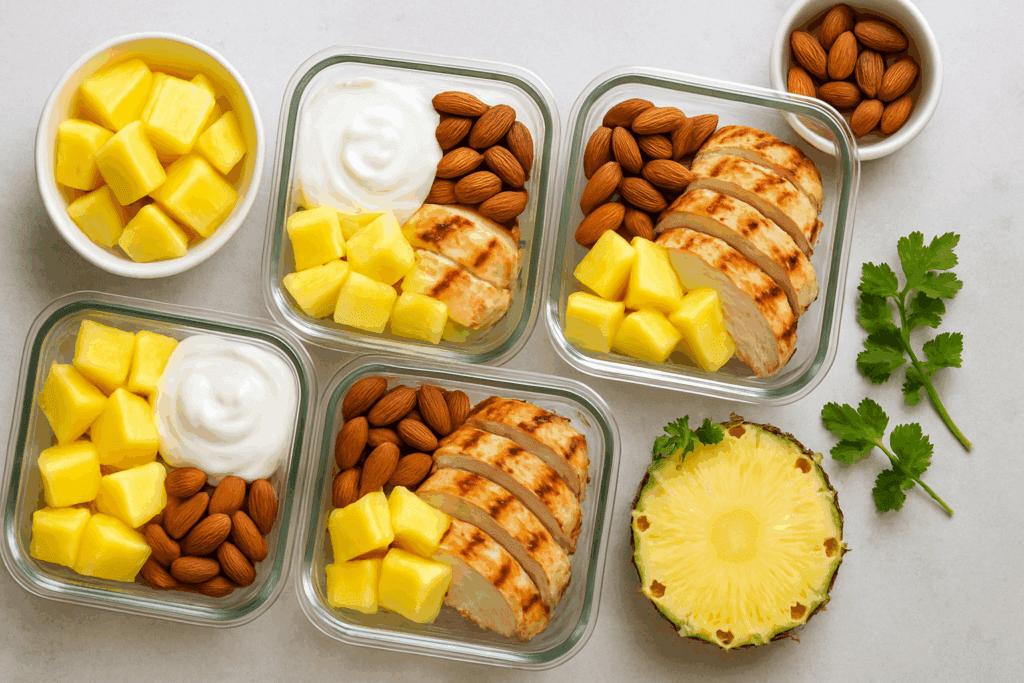
Using Pineapple Strategically in a Weight-Conscious Diet
The key to using pineapple for weight loss lies in how it’s incorporated into daily meals. Dietitians often recommend pairing pineapple with sources of protein or healthy fat to slow digestion and minimize blood sugar spikes. For example, combining fresh pineapple with a handful of almonds or a scoop of Greek yogurt can balance the meal’s macronutrient profile, leading to better hunger control and reduced snacking later in the day.
Timing also plays a role. Consuming pineapple earlier in the day may give the body more time to utilize its natural sugars for energy, particularly if eaten before or after physical activity. Post-workout snacks that include pineapple can replenish glycogen stores while taking advantage of bromelain’s anti-inflammatory benefits, potentially aiding recovery and reducing muscle soreness.
On the other hand, relying on pineapple juice or canned varieties packed in syrup can counteract its weight loss potential. Juicing removes the fiber that aids satiety and blood sugar regulation, while syrup adds unnecessary sugars. When shopping, choosing fresh or frozen pineapple without additives ensures the most nutritional benefit. When used with intention, pineapple becomes a strategic addition to a well-rounded, weight-focused meal plan—supporting the idea that yes, pineapple is good for weight loss when applied correctly.
Scientific Studies on Pineapple and Weight Management
To answer the recurring question, “does pineapple help you lose weight,” one must turn to clinical and nutritional science. While direct studies on pineapple and weight loss are limited, broader research on fruit consumption and body weight provides valuable context. A 2016 meta-analysis published in Nutrients found that higher fruit intake is consistently associated with lower body weight and reduced risk of obesity. Although the study didn’t single out pineapple, the findings support the inclusion of fruit as part of a weight management strategy.
Additional research has examined the effects of bromelain specifically, with some evidence indicating its potential to reduce adipogenesis—the formation of new fat cells—in vitro. While such findings are preliminary and need to be verified in human trials, they offer a scientific rationale for further exploring pineapple’s impact on body composition. Moreover, the anti-inflammatory and digestive benefits of bromelain are supported by clinical trials, adding credibility to its inclusion in functional diets.
Registered dietitians also underscore the importance of viewing pineapple as a whole food with synergistic benefits. Rather than isolating nutrients, they recommend focusing on overall dietary patterns that include diverse fruits, vegetables, lean proteins, and whole grains. In that context, pineapple is not only compatible with weight loss goals—it may actively enhance them.

Expert Opinions: What Dietitians and Nutritionists Say About Pineapple
According to leading nutrition professionals, pineapple deserves a place on the plate of anyone pursuing healthier eating habits—especially those looking for weight-friendly options. Registered Dietitian Nutritionist (RDN) Sarah Pflugradt notes that pineapple’s sweetness can satisfy cravings in a nutritious way while contributing to daily fruit intake goals. She emphasizes that whole fruit consumption is linked to better weight outcomes, not because fruit causes weight loss directly, but because it replaces less nutritious choices.
Other experts point to pineapple’s versatility. Dietitian Abbey Sharp, RD, encourages clients to use pineapple in savory dishes like stir-fries and salads, noting that its flavor complexity reduces reliance on calorie-dense sauces. She also warns against overconsumption of fruit juices and advises choosing fiber-rich forms to maximize fullness and metabolic balance.
From a clinical nutrition standpoint, pineapple’s high vitamin C and antioxidant levels support immune health and reduce oxidative stress—factors that, while not directly tied to weight loss, contribute to better overall health and sustainability of wellness efforts. These perspectives reinforce the view that pineapple is healthy for weight loss when used mindfully and within a whole-food-based framework.
Frequently Asked Questions: Pineapple and Weight Loss
1. Can pineapple be used in meal prepping for weight loss without spiking blood sugar levels?
Yes, pineapple can be a strategic part of meal prepping for weight loss, particularly when paired with other macronutrients to slow sugar absorption. While some may be concerned about the fruit’s natural sugar content, consuming pineapple alongside lean proteins or healthy fats—like grilled chicken or avocado—can reduce glycemic impact and help maintain stable blood sugar levels. For individuals wondering, does pineapple help you lose weight, the answer depends on whether it’s integrated mindfully into the overall meal composition. For instance, a quinoa bowl topped with pineapple salsa offers both flavor and a favorable nutrient profile that supports satiety and digestion. Incorporating pineapple this way allows it to play a supportive role in structured, low-glycemic meal plans that promote fat loss without unnecessary glucose spikes.
2. Is canned pineapple a suitable alternative to fresh pineapple for weight loss purposes?
Canned pineapple can be included in a weight-conscious diet, but caution is warranted when it comes to added sugars and syrup content. Many canned varieties are packed in heavy or light syrup, which can dramatically increase calorie and sugar intake without contributing additional nutrients. If you’re asking is pineapple good for weight loss and considering canned options, choose products labeled “packed in 100% pineapple juice” with no added sugar. These retain more of the original fruit’s fiber and nutritional value. However, even then, portion control remains critical. While canned pineapple is more convenient, it lacks the textural fiber integrity of fresh pineapple, which may slightly reduce its satiating effect and overall weight loss benefits.
3. Can pineapple consumption affect cravings or emotional eating patterns during dieting?
Surprisingly, pineapple may help reduce the intensity of cravings, especially for those who struggle with emotional eating driven by sugar dependency. Its naturally sweet taste can satisfy a psychological urge for dessert-like foods without the need for refined sugar or high-fat options. This makes pineapple for weight loss not just a physical strategy but also a behavioral support tool. By integrating pineapple into mindful eating practices—such as pausing to savor each bite and tuning into hunger cues—individuals can retrain their taste preferences toward healthier options. Over time, such adjustments may reduce the compulsive urge to snack or emotionally eat, helping reinforce more sustainable dietary habits.
4. Are there specific times of day when eating pineapple is more effective for weight loss?
Timing can indeed influence the effectiveness of pineapple in a weight loss routine. Many nutritionists recommend consuming carbohydrate-rich fruits like pineapple earlier in the day—such as with breakfast or post-workout meals—when insulin sensitivity is higher and the body is more likely to utilize natural sugars as energy rather than storing them as fat. For those wondering does pineapple help u lose weight, incorporating it into a morning smoothie or a midday salad may yield better results than eating it late at night when metabolic rate slows. This strategic timing aligns with circadian rhythms and helps optimize nutrient absorption and caloric efficiency throughout the day.
5. How does pineapple compare to “superfoods” like chia seeds or kale in supporting weight loss?
While pineapple isn’t always included in the typical superfood lists, it holds its own due to its unique enzymatic and anti-inflammatory properties. Unlike kale, which is dense in fiber and micronutrients but lacks sweetness, pineapple offers the added benefit of satisfying sweet cravings while still contributing essential nutrients. In contrast to chia seeds, which provide high levels of omega-3s and fiber but require preparation, pineapple is ready-to-eat and hydrating, making it an ideal grab-and-go option. In discussions of whether pineapple is healthy for weight loss, it’s clear that while it may not offer every benefit that so-called superfoods provide, it adds value in different and equally important ways—especially in promoting dietary adherence and variety.
6. Does freezing pineapple affect its weight loss properties or nutrient density?
Freezing pineapple does not significantly diminish its nutritional value, making it a great option for long-term use in smoothies or meal prep. Most of its vitamin C, fiber, and bromelain enzyme content remain intact when properly frozen and thawed. For individuals looking at pineapple for weight loss over time, frozen pineapple can be a convenient, budget-friendly alternative to fresh fruit. It also allows for precise portion control, which can reduce overeating and food waste. Just be sure to avoid pre-packaged frozen pineapple blends that contain added sugars or syrup coatings, as these can undermine your weight management goals.
7. How does pineapple interact with other weight loss supplements or medications?
Pineapple is generally considered safe to consume alongside most weight loss supplements and medications, but there are a few notable exceptions. The enzyme bromelain found in pineapple can potentially enhance the absorption of certain medications, including antibiotics and blood thinners. This can lead to altered drug effectiveness or increased side effects, so it’s important for individuals on prescription therapies to consult a healthcare provider before significantly increasing pineapple intake. When exploring whether does pineapple help you lose weight in combination with supplements, it’s best to approach dietary changes holistically and with professional guidance to avoid unintended interactions.
8. Can pineapple be used as a prebiotic or gut health enhancer in a weight loss plan?
Yes, pineapple has prebiotic potential due to its fiber content and natural enzyme composition, which can help support the growth of beneficial gut bacteria. A balanced gut microbiome plays a pivotal role in regulating body weight, hunger hormones, and fat storage. For those exploring is pineapple healthy for weight loss, it’s worth noting that supporting digestive health may be one of pineapple’s most underrated benefits. Regular pineapple consumption may enhance microbiota diversity, especially when paired with fermented foods like kefir or kombucha. This synergy could lead to better nutrient absorption, reduced inflammation, and improved metabolic flexibility—all important factors in sustainable weight management.
9. How can pineapple be used in culturally diverse weight loss recipes?
Pineapple’s global appeal makes it a versatile ingredient in culturally inclusive weight loss meals. In Thai cuisine, it’s often paired with savory elements like chili, ginger, and lean protein, creating flavorful dishes with minimal added fat. In Latin American traditions, pineapple is used in salsas or infused water (“agua fresca”) for a refreshing, low-calorie flavor enhancer. These preparations align well with clean eating principles and offer a dynamic way to explore pineapple for weight loss beyond Western-style fruit bowls or smoothies. Embracing diverse culinary practices can make healthy eating more enjoyable and culturally relevant, reducing dietary fatigue and improving long-term adherence.
10. What are the long-term implications of using pineapple regularly in a weight loss strategy?
Long-term incorporation of pineapple into a weight loss regimen can support more than just the scale—it can reinforce broader health behaviors such as increased fruit intake, improved hydration, and reduced reliance on processed sugars. Over time, these habits may lead to healthier cholesterol levels, reduced inflammation, and improved digestive function. While asking does pineapple help you lose weight may focus on short-term results, the more significant impact may lie in the sustainability it offers as part of a whole-food-based eating pattern. It helps individuals establish a positive relationship with food that is rooted in enjoyment, nutrition, and balance—three pillars of long-term wellness success.
Final Thoughts: Is Pineapple Good for Weight Loss When Eaten Mindfully and Strategically?
When viewed through the lens of nutrition science, practical experience, and expert opinion, the answer to “is pineapple good for weight loss” becomes clear. Yes, pineapple can play a supportive role in a healthy, sustainable weight loss plan—especially when it’s consumed in its whole form, paired with protein or healthy fats, and eaten as part of an overall diet that prioritizes nutrient density and portion control.
It is important to remember that no single food, including pineapple, has the power to induce weight loss on its own. However, as a naturally sweet, fiber-containing fruit rich in bromelain and vital nutrients, pineapple offers several metabolic advantages that may help individuals reach their health goals. For those wondering “does pineapple help you lose weight” or “does pineapple help u lose weight,” the evidence suggests it can contribute meaningfully—especially when replacing less healthy, processed options.
Ultimately, pineapple is healthy for weight loss not because it’s a magical fat burner, but because it aligns with the principles of whole-food nutrition, supports digestive health, aids satiety, and brings a burst of flavor to meals without sabotaging calorie goals. In moderation and with awareness, pineapple becomes more than just a tropical treat—it becomes a valuable part of the weight-conscious eater’s toolkit.
Further Reading:
Weight Loss Tips: Can Pineapple Help Boost Weight Loss?


